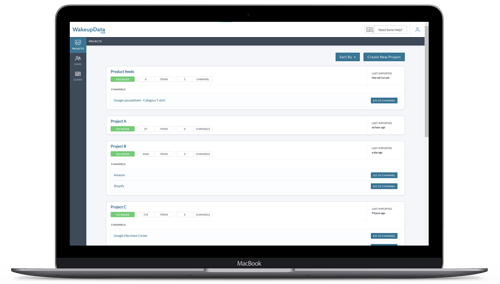How Machine Learning is the key to Digital Transformation in ecommerce
Posted on October 20, 2019 (Last Updated: July 14, 2021)
E-commerce companies already have a lot of data at their fingertips. But making full use of that data is a challenge.
Machine learning is able to make sense of digital data at a faster rate than any human is capable of.
There are a myriad of possibilities when it comes to applying this machine learning. So how can you decide what to prioritize and how to begin shaping your digital transformation decisions in the eCommerce industry?
Machine learning as a growing part of digital transformation
Simply put, digital transformation is the process of using digital technologies to create or alter new or existing business processes, culture, and customer experiences to meet changing business and market requirements (source).
Placing customers as the central focus, digital transformation seeks to move away from traditional roles - re-imagining how we do business.
A survey by Infosys found that 75% of their respondents said machine learning played a significant role in their organizations’ digital transformation, and that the average amount of time managers spent executing day-to-day activities at the end of an AI-supported digital transformation was 84% more than for organizations beginning a transformation.
“Technologies with the ability to proactively assemble and deliver information through automated composition engines are fostering a movement from human- to machine-generated business content,”
 Image credit: Infosys
Image credit: Infosys
More and more often, companies are using conclusions based upon machine-learning to digitize business processes, not only making decisions faster but also acting on those decisions without a human having to be involved, streamlining the business process.
Orlando Trott on Medium.
“In some cases, organizations have integrated their systems to auto-order inventory when product is low. Agriculture is testing AI in self-driving or program assisted tractors while consumer packaged good marketing departments are using AI to detect and direct advertisements towards very specific audience groups based on location and personality type.”
When integrated and paired with AI, businesses can experience streamlined workflows and become more efficient.
Machine Learning Methods
Before we go any further and look at the specific impact on the eCommerce industry, let’s understand the different Machine Learning methods (source):
-
Supervised Learning: Supervised Learning is a type of Machine Learning used to learn models from labeled training data. The best example of supervised learning could be for voice assistants like Apple Siri, Amazon Alexa, Microsoft Cortana, and Google Assistant - each of which are trained to understand human speech and intent .
-
Unsupervised Learning: Unsupervised Learning is used to extract inferences from datasets that consist of input data without labeled responses. This is usually based on the idea of clustering, where for example, an online news portal would segments articles into various categories like business, technology, sports, etc.
-
Reinforcement Learning: Reinforcement Learning is a type of Machine Learning that allows the learning system to observe the environment and learn the ideal behavior -based on the idea of a cumulative reward.
E.g: Manufacturing units use robots to identify a device from one box and put it in a container. The robot learns this by means of a rewards-based learning system, which incentivizes it for the right action.
Machine Learning: The Impact on ecommerce
Search Ranking
If your shoppers can’t find what they’re looking for, they won’t be able to buy it. We may be too spoiled by Google’s search engine to consider that not all search across all channels is intelligent.
Often, product searches fall short of delivering results that truly answer the query. And with multi-channel preferences growing when it comes to eCommerce (graph below), factors like content, preferences, and similar items all play into providing the optimal search results.
Machine learning is changing ecommerce, making SERPs more relevant by extracting information from deep within the patterns of search and purchases—rather than just relevant keywords.
Product Recommendations
Amazon has proven without question that product recommendations work. Their Recommendation Engine is responsible for 35% of its sales. But it takes a lot of computing power to find the right patterns in product sales and shopping behaviors.
Machine learning can quantify buying behavior over and over again, each time digging deeper into trends. Based on reinforcement learning, specific tools like Clerk.io Recommendations engine can add greater value to your online sales campaigns by learning your customers' interests, looking at factors like sales volume, trends and seasonal relevance to determine which products to push at what time.
The data that they gather is then used to provide recommendations which help your customers navigate to the exact products they are looking for across all your sales channels.
Recommendations data can then be merged onto your existing feeds to push the right products to the right clients.
Customer Support & Self Service
Providing quality customer service in e-commerce is challenging. Doing so at scale is even more daunting. But one answer is to use machine learning technology like chatbots.
Intelligent chatbots are able to use natural language to communicate with a customer, identify an issue, and resolve the issue.
Automating an aspect of your customer support and enabling self-service makes it easier for you and your customer to have higher satisfaction. There’s a lot of creativity to how machine learning can be used to help customers, chatbots being just one small example.
However, the intent always remains the same: higher customer satisfaction.
Pricing Optimization
Pricing is important. Online pricing is critically important. You can’t just rely on a set markup rate or even the local market price to win the sale.
It’s easier than ever to compare prices from one competitor to another with just a few clicks. And shoppers are using price comparison across sites to get a better deal.
Machine learning technology can change your prices to account for many factors at once. Your competitors’ prices, demand, time of day, and type of customer could all influence your price.
Related: Product Feed Optimization Guide for ecommerce retailers
Conclusion
As you can see, there are a lot of ways in which machine learning is already influencing eCommerce. Many of these are either already in use or will be soon.
As an ecommerce business wanting to stay on the cusp of new technologies and one step ahead of competitors - machine learning should play a greater part in your digital transformation strategy over the next few years.
At WakeupData we are currently developing a tool which implements machine learning as a means of giving you a full insight on a granular, product level of your product feeds.
We know that ecommerce businesses and digital agencies face a number of key issues:
- Lack of overview and control of what actually sells on the various channels.
- Errors in stocks, prices, and lack of sales prices.
- Suboptimal optimization done on the feeds that we receive.
- Marketing spend too high per item on channels.
- ROAS vs Margin
- Often stuck with a large inventory by the end of the season.
- Lack of context about what products are selling and when.
- Weather, special days, competitors
Through machine learning and best practice, we have developed a feed solution that solves all of the above.
The only requirement on your part? A Google Shopping feed.
...sounds good? Stay tuned!
Get the latest news on new product updates and latest arrivals through our newsletter..





